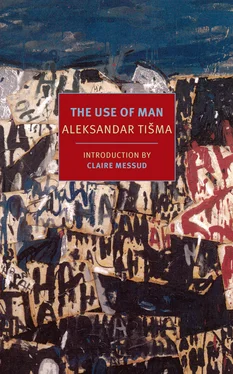Aleksandar Tišma - The Use of Man
Здесь есть возможность читать онлайн «Aleksandar Tišma - The Use of Man» весь текст электронной книги совершенно бесплатно (целиком полную версию без сокращений). В некоторых случаях можно слушать аудио, скачать через торрент в формате fb2 и присутствует краткое содержание. Год выпуска: 2014, Издательство: NYRB Classics, Жанр: Современная проза, на английском языке. Описание произведения, (предисловие) а так же отзывы посетителей доступны на портале библиотеки ЛибКат.
- Название:The Use of Man
- Автор:
- Издательство:NYRB Classics
- Жанр:
- Год:2014
- ISBN:нет данных
- Рейтинг книги:5 / 5. Голосов: 1
-
Избранное:Добавить в избранное
- Отзывы:
-
Ваша оценка:
- 100
- 1
- 2
- 3
- 4
- 5
The Use of Man: краткое содержание, описание и аннотация
Предлагаем к чтению аннотацию, описание, краткое содержание или предисловие (зависит от того, что написал сам автор книги «The Use of Man»). Если вы не нашли необходимую информацию о книге — напишите в комментариях, мы постараемся отыскать её.
A work of stark poetry and illimitable sadness,
is one of the great books of the 20th century.
The Use of Man — читать онлайн бесплатно полную книгу (весь текст) целиком
Ниже представлен текст книги, разбитый по страницам. Система сохранения места последней прочитанной страницы, позволяет с удобством читать онлайн бесплатно книгу «The Use of Man», без необходимости каждый раз заново искать на чём Вы остановились. Поставьте закладку, и сможете в любой момент перейти на страницу, на которой закончили чтение.
Интервал:
Закладка:
No longer hurrying, a premonition of disaster making his step heavy and hesitant, Sredoje went in, too. After the bright sun, in the dark interior of the church, he could not at once make out his father. He went past a row of lighted candles, headed toward the pulpit, before which, on trestles, stood a freshly constructed, unpainted coffin, and inside it a sharp, thin face propped up on a cushion. It was not until he looked closely that he recognized his brother. Without glasses, Rastko looked younger, childlike. Then Sredoje felt a shapeless mass of clothing and limbs at his feet. He bent down to look: it was, indeed, his father. From the depths of the church, people came forward, a hand sprinkled water from an earthenware vessel over his father’s face. His father opened his eyes, groaned, tried to get up, and again collapsed, sobbing, on the floor. Sredoje tried to catch him under the arms; other hands helped; and as they got his father back on his feet, a dark-skinned priest with a short trimmed beard hurried up to them and beckoned them to a side door. They took Lazukić out into the open air, through a porch entrance to the priest’s lodging next door, and sat him on a couch.
The priest’s wife ran up, dark, pretty, with down above her upper lip, in a black dress that had grown too tight for her and molded her small, protruding stomach. She bustled about, opened a cupboard the width of a whole wall, and took out a bottle of brandy. Together they forced several drops of the liquid between Lazukić’s lips. He sucked the brandy in, came to his senses, and looked around. “Out, everybody, out,” the priest urged them all impatiently, and one by one, though reluctantly, Sredoje’s helpers left.
“Are you with him?” asked the priest, looking sharply at Sredoje, who had not left.
“Yes. I’m the brother — I mean, his other son.”
The priest nodded. “My condolences. I’ve made arrangements to bury the boy today.” He stood there as if expecting an answer, but since Sredoje said nothing, he left the room.
Sredoje was now alone with his father, who fell into a half-sleep from which he occasionally started with a sob. Outside, the sun emerged from the clouds, brightening the room; a yellow ray illuminated the bottom corner of the couch and Lazukić’s feet in their mud-encrusted shoes. A rhythmic banging was heard, and Sredoje realized that someone was nailing down the coffin.
His brother’s death, because it was so unexpected, was a shock to him. He recalled exactly the details that led up to it, starting with the blister on Rastko’s foot and his father asking the NCO to find a place for Rastko on the cart. What would have happened if it had been he, Sredoje, and not Rastko, who got the blister and was put on the cart? In that case, the cart would have bolted with him, the bullets would have torn into him, and he would now be lying in the coffin dead, with no more blood in his body, oblivious of the warm day, of the morose priest and his pretty, energetic wife. That not only could have happened, but that would have happened, and the thought sent a shudder of the unknown through Sredoje.
Impatient, tired of staying where nothing was going on, he went out to the porch. There, the people who had helped him carry his father into the priest’s house were standing in a circle. They must have known by now who Sredoje was, because they fell silent when he appeared and stared at his face. He felt uncomfortable that in that face they did not find the despair they were expecting; in self-defense he went up to them and asked the first thing that came to mind: “Where is the priest?” No one answered; they went on looking at him with intense curiosity. Then the priest appeared and shouted, as if giving an order, “Let’s go!” He went into the room, and Sredoje followed. Lazukić was sitting on the edge of the couch, head in his hands. The priest donned his vestments and approached them. “What was the young man’s name?”
Sredoje looked at his father and saw that his chin was trembling. “Rastko Lazukić,” Sredoje answered.
“Profession?”
“Law student.”
At that, Nemanja Lazukić raised his weary face. “My son! My firstborn!” And he began to weep uncontrollably.
Sredoje sat down beside him and put an arm around his shoulders, surprised at how small and frail his father’s body had become. He said, “You stay here. I’ll go alone.”
His father shuddered at the suggestion, jumped to his feet in fear, swaying slightly. “No, no. How could you think of it? I’m coming!”
They walked out arm in arm. On the porch the funeral procession was already lined up: the coffin, nailed down, covered with black cloth, stood on a cart, followed by the priest and the same cluster of people, though now fewer in number. Sredoje cast a glance at the house, hoping that the priest’s wife would put in an appearance, perhaps even join the procession, but she didn’t even peep through the door. Two men from the group pulled the cart, and the procession moved from the porch, down a passageway behind the church, and into a narrow, crooked street. Supporting his stumbling father, Sredoje looked at the houses and the men and women lined up in front, their eyes fixed on the procession; he still felt uncomfortable because he was not properly devastated by his loss, though less so as he grew used to it. Slowly, very slowly, they wound their way out of the town between run-down houses with gypsies perched in front, reached the cemetery, crisscrossed with bushes and trees, and stopped next to an open grave, where two men in worn, ragged clothes were sitting on a heap of fresh earth.
The priest cleared his throat, read a prayer that incorporated Rastko’s name and profession, in a clear, sharp voice intoned the psalm for the dead, and, making the sign of the cross over the grave, signaled to the two gravediggers with his eyes. They set to work, lowering the coffin on ropes and shoveling earth over it. Nemanja Lazukić moved toward the grave, but Sredoje held him back until he realized that his father wanted only to throw a handful of earth on the coffin. He helped him to do this, and repeated the gesture himself. When the grave was filled and the earth shaped into a mound with light blows of the shovels, Sredoje gently urged his father to move away, to leave.
The priest fell in step beside them and asked, “Where will you go now? Do you have a place to stay?” When they said no, he nodded as if that was what he had expected. “I’ll go with you to the inn and we’ll make arrangements with the landlord.” They quickened their pace back into town, taking the same streets. The priest asked briefly how Rastko had met his end, wrinkling his nose at their answer. Lazukić stammered out a question about the funeral expense, but the priest with a wave of the hand murmured that there was plenty of time for that. “Now we will have to help one another more,” he added after a pause, lowering his voice confidentially and casting a glance at the two of them.
It was dusk now, and there were fewer people on the streets, but the inn, the same inn they had entered upon their arrival in Ub, was if anything more crowded, and at a table in the center two German soldiers sat with glasses in front of them. The priest motioned to the proprietor to come out from behind the counter and talked with him for some time; then the proprietor came up to Lazukić and told him that he had one guest room upstairs and would prepare it for him. The priest said good-bye to them and left.
“Would you like a bite to eat?” asked the proprietor.
Lazukić shook his head indifferently and asked where the room was. But at the mention of food, Sredoje felt a hunger as violent as a blow in the stomach. “I don’t mind waiting for something to eat,” he said.
Читать дальшеИнтервал:
Закладка:
Похожие книги на «The Use of Man»
Представляем Вашему вниманию похожие книги на «The Use of Man» списком для выбора. Мы отобрали схожую по названию и смыслу литературу в надежде предоставить читателям больше вариантов отыскать новые, интересные, ещё непрочитанные произведения.
Обсуждение, отзывы о книге «The Use of Man» и просто собственные мнения читателей. Оставьте ваши комментарии, напишите, что Вы думаете о произведении, его смысле или главных героях. Укажите что конкретно понравилось, а что нет, и почему Вы так считаете.












